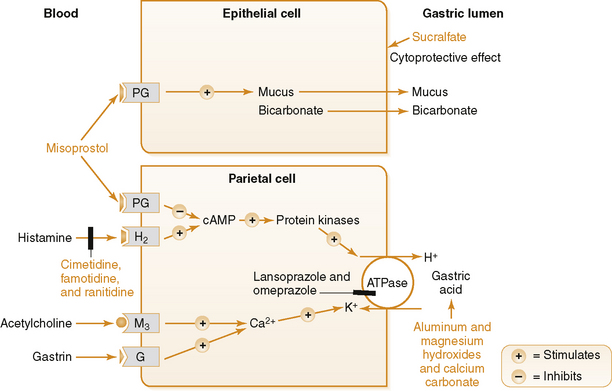Chapter 21 Drugs Used in the Treatment of Gastrointestinal Disorders
(1) Blocks histamine action at the H2-receptor site on parietal cells, thus inhibiting gastric acid secretion (see Fig. 21-1)
• Inhibition of liver microsomal metabolism of many drugs that utilize the cytochrome P450 system (e.g., beta blockers, benzodiazepines, calcium channel blockers, opioid agonists, tricyclic antidepressants)
(1) Control of secretory conditions such as Zollinger-Ellison syndrome and GERD; especially effective against nocturnal secretion (i.e., 90% reduced)
• Treatment of duodenal ulcers associated with Helicobacter pylori (given with a bismuth compound and an antibiotic)
b. These drugs are benzimidazole compounds that irreversibly inhibit H+/K+ ATPase (adenosine triphosphatase), the parietal cell proton pump.
(2) They should be taken with meals so that food can stimulate acid secretion required for bioactivation.
f. These drugs are more effective than H2 antagonists for GERD or nonsteroidal anti-inflammatory drug (NSAID)-induced peptic ulcers.
• These drugs act by binding to ulcers; providing a protective coating against digestion by acid and pepsin
d. Stimulates synthesis of prostaglandins, which have cytoprotective effects on the gastrointestinal tract
Stay updated, free articles. Join our Telegram channel

Full access? Get Clinical Tree



